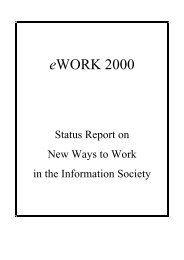Proceedings of 8th European Assembly on telework (Telework2001)
Proceedings of 8th European Assembly on telework (Telework2001)
Proceedings of 8th European Assembly on telework (Telework2001)
Create successful ePaper yourself
Turn your PDF publications into a flip-book with our unique Google optimized e-Paper software.
30Working <strong>on</strong> three pillarsThe programme described is tough, but it is in the best interest <str<strong>on</strong>g>of</str<strong>on</strong>g> all players involved. Insightfulselfishness if not global ethos should be the driving force. To get there, we need a dense interacti<strong>on</strong><str<strong>on</strong>g>of</str<strong>on</strong>g> co-regulati<strong>on</strong> between the three major agencies today working in the field <str<strong>on</strong>g>of</str<strong>on</strong>g> global governance.This is, <str<strong>on</strong>g>of</str<strong>on</strong>g> course, the governments with their internati<strong>on</strong>al agreements, the industry, with itscodes <str<strong>on</strong>g>of</str<strong>on</strong>g> c<strong>on</strong>ducts, its accounting and reporting systems etc. and, finally, the world civil society,in particular the n<strong>on</strong>-governmental organisati<strong>on</strong>s. These three groups are heavily supported byscience, the legal systems and the juridical systems. Of course, there is a very delicate relati<strong>on</strong>shipalso with c<strong>on</strong>sumers, c<strong>on</strong>sumers´ behaviour and c<strong>on</strong>sumers´ protecti<strong>on</strong>. Certainly, all that wassaid has to be seen in a framework <str<strong>on</strong>g>of</str<strong>on</strong>g> subsidiarity, that means issues have to be addressed at therespective stakeholder levels, be they global, c<strong>on</strong>tinental, nati<strong>on</strong>al, regi<strong>on</strong>al or local.C<strong>on</strong>necti<strong>on</strong> with the Kyoto c<strong>on</strong>tractCertainly, the Kyoto c<strong>on</strong>tract gives us a case study about the topics at hand. This c<strong>on</strong>tract isso important because here we talk about global resources (e.g. the right to create greenhousegases) that are extremely heavily used and exploited by the richest countries <str<strong>on</strong>g>of</str<strong>on</strong>g> the world. Thisexploitati<strong>on</strong> is part <str<strong>on</strong>g>of</str<strong>on</strong>g> our wealth creati<strong>on</strong> processes. We use those resources to such an extentthat we are eating up today future chances <str<strong>on</strong>g>of</str<strong>on</strong>g> progress <str<strong>on</strong>g>of</str<strong>on</strong>g> the poorer countries in development. Weurgently need steps to a soluti<strong>on</strong> by which the global increase in greenhouse gases is stopped or atleast regulated. We know that any perspective for reas<strong>on</strong>able measures is for 2012 the earliest. Atthe moment, we are doing some preparatory steps between the most developed countries.One essential questi<strong>on</strong> here is, where we do invest the financial resources we are willing toimplement for solving this problem? There is a tough debate <strong>on</strong> whether at least 50 percentshould be domestic implementati<strong>on</strong> or not. The US, who is most reluctant in all those issues,insists <strong>on</strong> global implementati<strong>on</strong> and from an ec<strong>on</strong>omic point <str<strong>on</strong>g>of</str<strong>on</strong>g> view, they are absolutely right.The <str<strong>on</strong>g>European</str<strong>on</strong>g>s, who are much more pr<strong>on</strong>e to the issue, argue differently. They follow a misledethical argument, by which they have to do their homework domestically. For a number <str<strong>on</strong>g>of</str<strong>on</strong>g>reas<strong>on</strong>s that does not make sense. The soluti<strong>on</strong> must be a global implementati<strong>on</strong> and any suchglobal implementati<strong>on</strong> has domestic c<strong>on</strong>sequences, <str<strong>on</strong>g>of</str<strong>on</strong>g> course. For instance, any global trading <str<strong>on</strong>g>of</str<strong>on</strong>g>permissi<strong>on</strong> rights makes it necessary to generate domestically the m<strong>on</strong>ey for those rights. Thegenerati<strong>on</strong> <str<strong>on</strong>g>of</str<strong>on</strong>g> such a m<strong>on</strong>ey flow could and should be d<strong>on</strong>e via nati<strong>on</strong>al eco taxes. That gives thepressure <strong>on</strong> the own society to adapt. And whether then things are d<strong>on</strong>e globally or nati<strong>on</strong>allywill be decided by the ec<strong>on</strong>omic system and questi<strong>on</strong>s <str<strong>on</strong>g>of</str<strong>on</strong>g> efficiency, not by politics. Certainly, anysuch eco tax scheme would reas<strong>on</strong>ably be d<strong>on</strong>e in a way that forces innovati<strong>on</strong> into a directi<strong>on</strong>by which we get rid <str<strong>on</strong>g>of</str<strong>on</strong>g> the present high level <str<strong>on</strong>g>of</str<strong>on</strong>g> polluti<strong>on</strong> relative to our industrial producti<strong>on</strong>(dematerialisati<strong>on</strong>, eco–efficiency increase).








